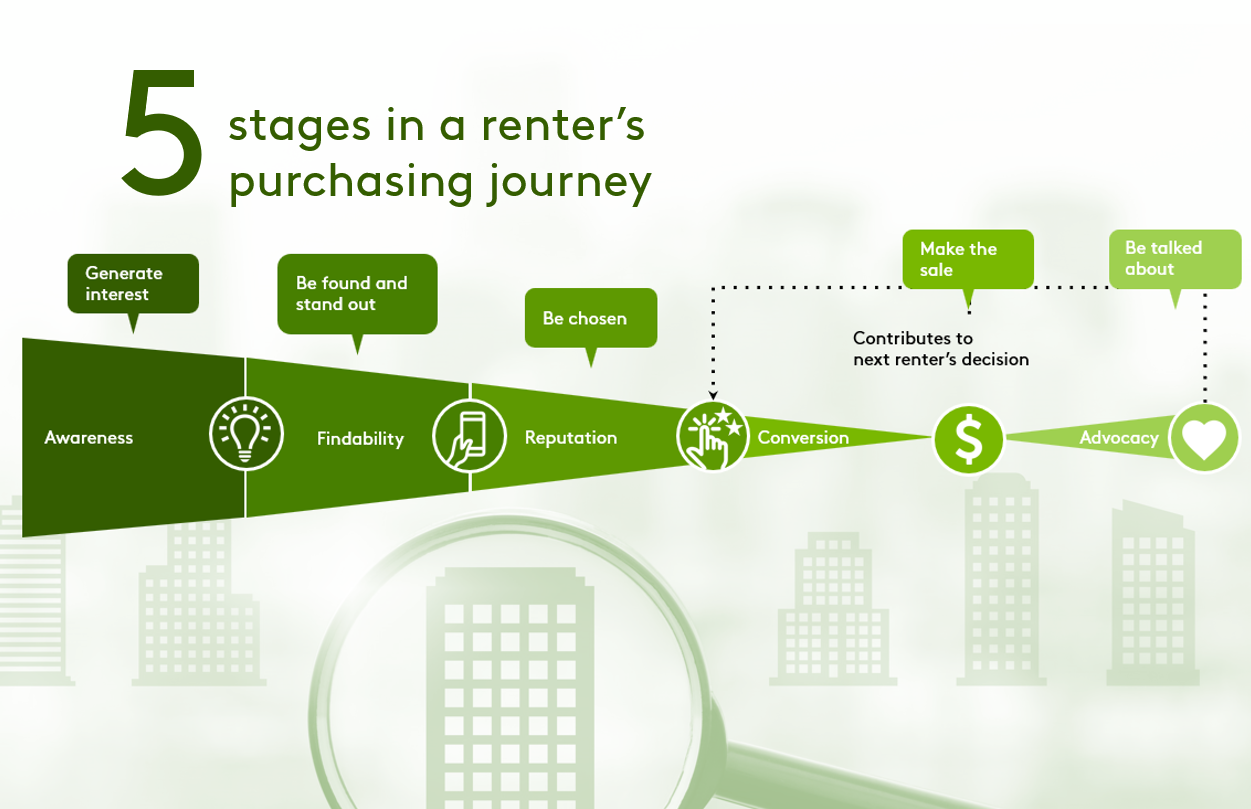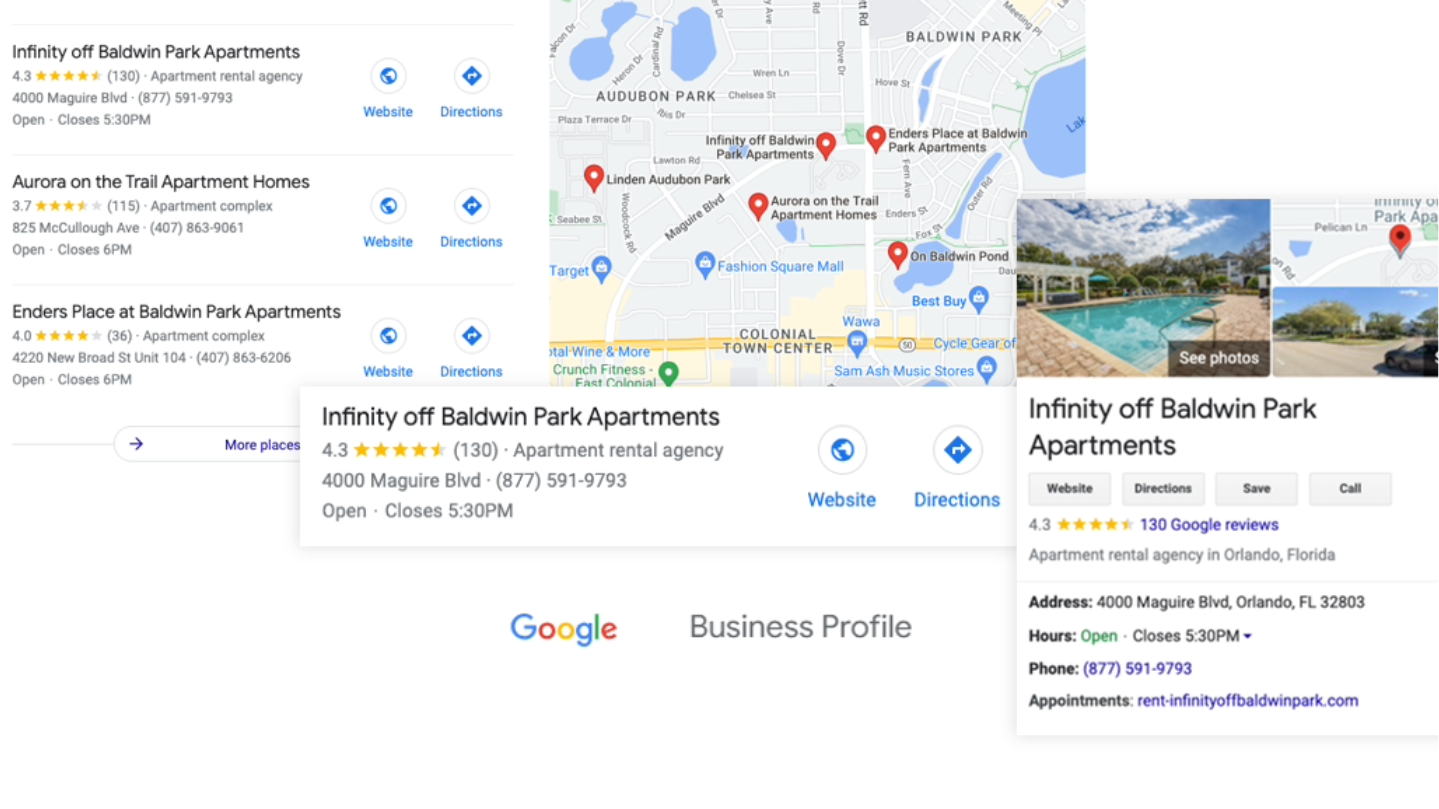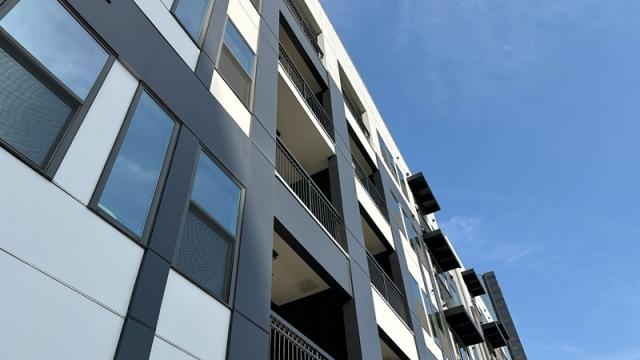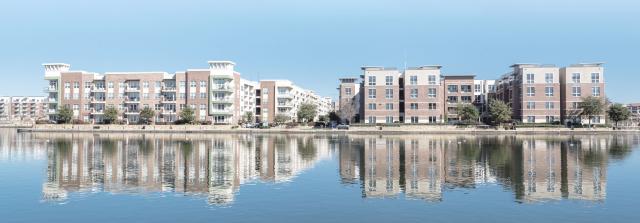
What do renters think of your community when they browse your listings and website? What comes up when someone searches for your property on Google? These are all important aspects of your online reputation.
From boosting renewal rates to driving up rental income, your online reputation is a multimillion-dollar asset that shouldn’t be overlooked. Here’s what you need to know about your online reputation and how you can protect it.
What is online reputation?
Your online reputation is the perception renters have of your community, which affects their level of trust and influences their decision to sign a lease with you.
You can also think of this as your virtual curb appeal. Do renters look you up and then turn away, or do they become more interested in becoming your next residents?
Online reputation is made up of many components, including:
Your social media presence
Your search rankings
What current residents are saying about you online, as in ratings and reviews
How you respond to online feedback
Your apartment listings, photos and videos, and community website also contribute to your online reputation.
Why does online reputation matter?
Online reputation is a key factor affecting renters’ interest in your community. A negative reputation can turn customers away before they even reach out to your leasing team — and even drive your customers to sign with your competitors.
Apartment communities with high star ratings often enjoy lower turnover rates, higher renewal increases, and higher average rental income increases than those communities with lower or no ratings.

A renter’s relationship with your community involves these five critical concepts, which each represent a stage in the purchasing journey:
- Awareness is when you generate a renter’s interest in your property.
- Findability means the visibility of your property, which allows a renter to find you.
- Reputation affects how renters perceive you and affects whether they choose to continue to move down the sales funnel with your leasing team.
- Conversion is the moment when a renter signs a lease.
- Advocacy is the result of a satisfied customer, such as when your current residents promote your property to other renters.
Watch: How reputation affects the customer journey
What’s the role of reputation in a renter’s journey to becoming a resident? Erica Byrum, assistant vice president of social media, breaks it down in this short video:
How can you improve your community’s online reputation?
So, what can you do to make sure your property has a robust reputation among your current and future residents? These steps are key.
Step 1: Claim your business listing
Do you have a Google Business Profile? This is the first place to start in establishing a strong online reputation. This allows you to control the information that Google lists about your property across all its services, including Google searches and Google Maps.
Nearly nine in 10 consumers rely on Google to evaluate local businesses, according to BrightLocal.

Your Google Business Profile makes up 33 percent of Google’s algorithm determining how the search engine ranks your business! That means that claiming and maintaining your profile is essential to showing up in local searches and outranking your competitors.
Once you’ve claimed your Google Business Profile, you’ll want to do the same with the other essential business directories, such as Bing, Apple Maps, and Yelp. Make sure your details are up to date and consistent — that includes spelling! — across all your listings and your website. You’ll want to review these details on a regular basis to keep contact information, hours of operation, and web addresses up to date.
Watch: Why your business listing matters
Erica explains the importance of managing your property on Google Business Profile:
Step 2: Establish a robust presence on social media
Do you have a Facebook page? What about Instagram? Your social media channels are essential to your virtual curb appeal and should be an important branch of your marketing strategy.
Social media builds credibility among renters considering your property — and fosters loyalty among your future and current residents.

When done well, marketing your property on social media can expand your online presence, improve brand awareness and reputation among potential renters, and strengthen your relationship with current residents.
Depending on your marketing goals and audience, select which social media channels to use. Create channels for your property. As with business listings, keep the information on your profiles consistent and up to date across platforms.
Use your channels to post regularly about your community, sharing glimpses of what life for your residents is like and encouraging your residents to participate in community events. Plan your social media calendar in advance, and rely on content batching to get more mileage out of your content.
Social media channels can also double as a review platform. Not only do channels like Facebook host reviews and ratings, but any social media can also be a place to highlight positive reviews from your residents and solicit new comments from your community.
Watch: Inspiration for your social media posts
Not sure what to post on your social media channels? Check out Erica’s 21 ideas to keep your feed fresh.
Step 3: Solicit ratings and reviews
Do you first browse ratings and reviews before you purchase a new gadget online? Most consumers refer to reviews before buying a product. But it’s not just for shopping on Amazon. Ratings and reviews are an essential part of the customer journey for renters, too.
In fact, 98 percent of renters said that ratings and reviews are important to their decision-making process when selecting an apartment, according to an Apartments.com survey conducted in November 2023. And three in four described ratings and reviews as “very” or “extremely” important.

This means that your ratings and reviews — or lack thereof — can seriously affect your lead volume and your bottom line.
Reviews amplify your marketing efforts in three important ways:
- Reviews make you rank higher in search.
- Reviews provide useful feedback to attract renters and retain your residents.
- Reviews encourage prospects to choose your community.
Listings that have at least one review receive up to 50 percent more leads than listings that have no reviews, according to 2023 lead data research by Apartments.com.
And improving your average rating by just one star can increase your revenue by 5 to 9 percent, according to Harvard Business Review.
To make sure your prospects are seeing the best of what your community has to offer, regularly encourage your residents to leave reviews of your property.
Watch: How and when to solicit reviews
How can you solicit reviews effectively? When’s the right time to ask for a review? Join Erica to learn the best ways to solicit reviews from your residents.
Step 4: Respond to reviews
Just getting reviews isn’t enough. You’ll also need to respond to reviews — both negative and positive — to show renters that you care about your residents and their feedback. Nearly 90 percent of consumers report greater trust in businesses that respond to reviews, according to BrightLocal.
Responding to negative reviews can help neutralize the potential damage from these negative comments and restore consumer trust.
Almost all consumers — 96 percent —look for negative reviews specifically, according to Search Engine Journal. When you reply to these reviews, prospective consumers will see more than just the negative comments — they’ll also see how you react.
And not only does responding to reviews improve customer trust, it also helps your search rankings, making it easier for new renters to find you.
Watch: How to respond to reviews
What should you say when crafting a reply to a review? Check out Erica’s tips on exactly what to do — and what not to.
Need help with your online reputation?
Feeling overwhelmed? Maybe you’re looking for personalized support to manage your community’s specific needs. Whatever your situation, Apartments.com can help. Check out Apartments.com’s Social Media & Reputation Suite. This service offers a personalized approach to managing your social media presence and online reputation.
For more information about social media and online reputation, check out Erica’s full guide to better reviews and ratings (11-minute video).







